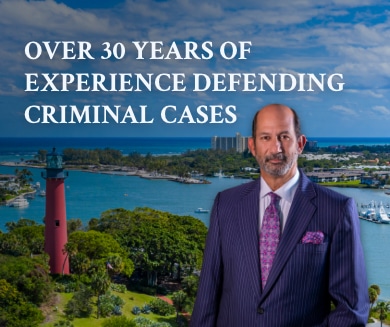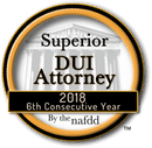Criminal Procedure FAQs
What types of sentences are there for crimes in Florida?
Who sets a sentence in Florida and how is it determined?
In Florida, the sentence is set by the court. The judge determines what your sentence will ultimately be. Different players do have an input into that sentence, that being the state attorney’s office, and your attorney, the defense attorney.
If there is an agreement of what a sentence should be, then it is up to the court to agree with the agreement. In essence, the court would listen to what a plea bargain was, and if the court is satisfied that that type of punishment is appropriate considering the facts of the case, the court would accept it.
If the court does not believe it’s appropriate, then the court may impose or inform the parties that it is not willing to accept that type of punishment and wants something more severe or less severe, depending upon the facts of the case.
What is the role of the prosecutor?
A prosecutor works for the state attorney’s office, and will be the individual prosecuting or advocating for the state against you. They’re the individual that your attorney has to work with, to determine whether or not the case can be resolved through some type of resolution. Or, if it’s going to be a trial, they’re going to be the attorney on the other side. It is always imperative to have your attorney have a good working relationship with these state prosecutors.
What happens when the case is over?
When the case or the trial is over and there’s a decision, if the court’s is going to impose a sentence, then there can be a sentencing hearing. If there’s not going to be a sentence because you were acquitted of the charges, then the court may entertain different motions that deal with returns of property of different pieces of evidence that were seized, and you get your belongings back. If the court had a protective order and took your firearm away from you, you can get your firearm back, and that protective order can be lifted.
Ultimately, if there is a conviction, the other step that an individual must do, is to deal with the issues of whether or not there are different appellate remedies that can be looked into, and that is whether or not it would be wise to file an appeal of that conviction, and the different standards that apply.
What is the point of a suspended sentence?
When a Court suspends a sentence, it is giving an individual a second shot. It is saying, “I am not going to impose that sentence at this point in time. Instead, I am going to suspend it. Place you generally on a probationary period. Give requirements that you must complete. As long as you complete the requirements and stay out of trouble, pick up no new arrests, then the Court will not impose that suspended sentence.” Again, it gives the Trial Judges the ability to motivate an individual to stay out of trouble by suspending a worse punishment over their heads.
What is the difference between hiring an attorney and using the appointed public defender?
In Florida, the Public defender system is still quite overloaded. Hiring a private attorney is going to allow you the ability to work one on one with a person that you have a higher level of comfort with. As the client, you have the ability to choose the attorney you’re going to be working with, whereas with the Public Defender, they are appointed to you. They don’t get an opportunity to choose their clients, but you certainly, with the Public Defender, do not get the ability to choose which attorney you like.
Again, with a private attorney you have the ability to research their background, their qualifications, and make that decision on your own.
What are the typical steps in a criminal proceeding in Florida?
An individual arrested in Florida will normally be brought before a magistrate within 24 hours for what’s called a first appearance hearing. From there, the individual is brought back usually within three to four weeks for what’s called an arraignment hearing. That is where the state of Florida will formally charge the individual and advise the individual of those charges. From there, the court will set different status conference hearings to determine what is going on with the case, eventually determining whether or not the case will be one that can be resolved through some form of plea bargain, or if it cannot, will be set down for the path to go and lead to a trial. Those are the normal steps that a criminal case will take here in Florida.
How will my sentence be decided in Florida?
In Florida, the court has ultimate discretion to determine your sentence. However, your attorney and the state attorney can have input to see whether or not the parties can reach a mutually agreeable sentence. If your attorney and the state attorney agree on certain sentencing conditions, those can be brought to the court to determine if that’s an appropriate sentence for the court to accept.
Once charges have been filed against me. How long before I receive a trial?
In Florida you can demand a trial, known as a speedy trial, within 90 days to 6 months, depending on the severity of charges. Normally speaking, if you waive that right to a speedy trial, your trial comes about when your attorney lets the court know that you are ready for that trial; when the appropriate pretrial actions have been taken, pretrial motions have been filed and heard, the admissibility of evidence has been decided prior to the beginning of that trial, then you will have that trial. Most of the times that’s anywhere from probably 6 months to 1 year.
Should I agree to a plea bargain?
The agreement to a plea bargain is ultimately dependent upon many facts. Again, what the crime is that you are charged with, and what is the plea offer? What are the ramifications now, the conditions of a sentence that you have to complete, be it probation or special conditions? Also, what are the ramifications in the future, once you’re done with probation? Will this type of a conviction stop you from being licensed to do what you choose to do? Will it stop you from obtaining a bank loan? Will it stop you from getting a home mortgage? Will it stop you from being able to possess fire arms, or be licensed for different occupations? Again, the factors that need to be looked at are dependent upon you, but you should look at as many as possible before you ultimately make that decision of accepting a plea offer.
What types of punishments do I face if convicted of a crime in Florida?
In Florida, if you’re convicted of a crime, you can be sentenced to a probationary period where the court fashions a punishment in the form of either community service hours, monetary fines, treatment or counseling, educational programs, suspension of licensing issues. The court imposes that type of a sentence. If your criminal activity is more severe or your record of criminal activity is more robust, then you can be sentenced to an incarcerated period of time. That can be a period of time up to one year in the county jail or for serious enough offenses, time in state prison.
What is a pre-sentence investigation report and what is it used for in Florida?
In Florida, if you are trying to get the court’s attention that there are certain issues you wish the court to be aware of during your sentencing hearing, that is when a pre-sentence investigation will be utilized. There, different investigative officers will be questioning the individuals that you wish to present evidence to the court. They’ll be questioning witnesses, character witnesses, employers, or potentially other individuals that will help your client get a good sentencing recommendation. They’ll be placed into a report and different information as far as your background, your prior history, and ultimately their recommendation will be presented to the court in one report called a pre-sentence investigation report. It keeps it open to all individuals to be able to put what they want the court to hear into the simple report that will be formally given to the court prior to a sentencing hearing.









